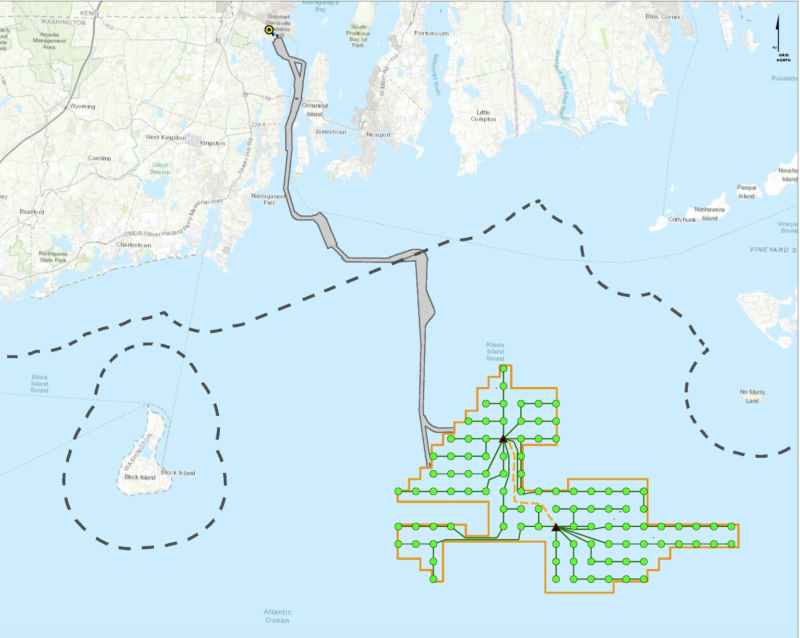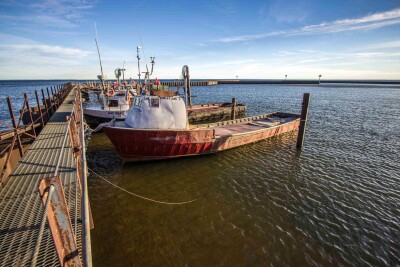Revolution Wind, a 704-megawatt turbine array planned for 15 miles off Rhode Island, gained final approval from the Department of Interior Tuesday. The joint venture by developers Ørsted and Eversource is the fourth offshore wind project to be greenlighted by the Biden administration, which now expects to have 16 project plans reviewed by 2025.
Under intense scrutiny for the project’s anticipated environmental and economic effects, the final review by the Bureau of Ocean Energy Management and other federal agencies focused on BOEM’s “Alternative G” as the “preferred alternative,” which could rearrange wind turbine locations on the lease tract “to reduce impacts to visual resources and benthic habitat.”
The alternative includes up to 79 possible positions for the installation of 65 turbines and two offshore substations to fulfill the project’s designed total nameplate rating of 704 MW within a 1-nautical mile grid spacing.
“This flexibility in design could allow for further refinement for visual resources impact reduction on Martha’s Vineyard and Rhode Island, or for habitat impact reduction in the NMFS (National Marine Fisheries Service) Priority 1 area,” according to BOEM’s environmental assessment report issued in July.
That analysis foresaw “long term moderate to major adverse impacts depending on the fishery and fishing operation. If BOEM’s recommendations related to project siting, design, navigation, access, safety measures, and financial compensation are implemented across all offshore wind energy projects, adverse impacts on commercial fisheries due to the presence of structures could be reduced.”
In announcing the approval Interior Secretary Deb Haaland said: “We will continue to maintain open communication and frequent collaboration with federal partners, Tribal Nations, states, industry and ocean users to address potential challenges to and identify opportunities for the continued success of the U.S. offshore wind industry.”
“The project’s approval underscores the Administration’s commitment to promoting domestic energy production and fighting climate change, while promoting economic growth and fostering environmental stewardship within coastal communities,” said Elizabeth Klein, director of the Bureau of Ocean Energy Management. “We are committed to working closely with Tribes, state and local leaders, industry, ocean users, and key stakeholders to responsibly develop this clean energy resource and ensure a sustainable future for generations to come.”
“Among them, Revolution Wind has committed to establishing fishery mitigation funds to compensate losses directly arising from the project incurred by recreational and commercial fisheries in Rhode Island and Massachusetts, and to creating a direct compensation program to reimburse lost revenues for fisheries from other states. Additionally, Revolution Wind has committed to measures such as vessel speed restrictions and construction clearance zones to reduce the potential for impacts to protected species, such as marine mammals, sea turtles, and Atlantic sturgeon.”
The federal approval comes a month after a sudden reversal to U.S. offshore power ambitions, when utility Rhode Island Energy announced it would not enter a power purchase agreement for a future, second-phase Revolution Wind 2 project because the projected costs to electric customers were too high.
“Higher interest rates, increased costs of capital and supply chain expenses, as well as the uncertainty of federal tax credits, all likely contributed to higher proposed contract costs,” according to the utility company. “Those costs were ultimately deemed too expensive for customers to bear and did not align with existing offshore wind PPAs (power purchase agreements).”
The utility’s decision added to the offshore wind industry’s troubles from rising costs, which already have developers looking to cancel contracts for two projects off Massachusetts and re-bid them in 2024.
But offshore wind boosters took heart from news of the long-debated Revolution Wind project winning its record of decision approval.
“Under state agreements, the project will deliver 400 MW to Rhode Island and 304 MW to Connecticut, powering nearly 250,000 homes,” according to a statement from the Business Network for Offshore Wind.” The ROD authorizes the construction of 65 turbines, two substations, and up to two export cables. The project is expected to utilize New London, Connecticut as a marshalling and installation port, while internal components will be manufactured at ProvPort in Providence, Rhode Island.”
“The U.S. offshore wind industry is on the move; the steady stream of offshore wind project environmental reviews is critical to the success of supply chain investments, and today’s announcement bolsters investments in component production at ProvPort in Rhode Island, cable manufacturing in South Carolina, steel fabrication in western New York, and shipbuilding in Texas and Louisiana,” said network CEO Liz Burdock.







